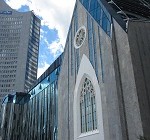In a world disturbed by viscous intolerance wandering about the city centre of Leipzig can be reassuring, even soothing.
The simple and elegant blocks of offices, museums, an opera house and a university are a reaffirmation of the power of creativity and beauty to defy false boundaries and rise from the ashes of blind hatred and destruction.
This is not merely because most traces of the fierce battles of World War II and the decay of the communist era have vanished. Neither is it because the city has appeared on a New York Times list of the ten most visit-worthy cities in the world.
Reaffirmations of that which builds civilizations are to be found in the details of this landscape. One example of this is Mendelssohn House, a small memorial tucked away in the by-lanes of what is one of the oldest cities of Europe. A towering figure of Western classical music, Felix Mendelssohn Bartholdy lived and died in Leipzig during the mid-19th century.
Mendelssohn had been born into a prominent Jewish family and in the 1930s the Nazi regime banned the performance and publication of his works. In 1936 a bronze statue of Mendelssohn near the Leipzig music hall was torn down by the Nazis and destroyed.
It was only in 2003, more than a decade after the collapse of communism and the reunification of Germany, that another monument to Mendelssohn was commissioned by the city government.
The inscription on the new monument, inaugurated in 2008, says: “May the language of music only tell of noble things”. On the sides are two medallions which symbolise church music and secular music.
Under communist rule religion was either ignored or actively discouraged. So the one church in Leipzig that remained unscathed by the war, which also served as the chapel of the local university, was dynamited by the government of East Germany in 1968.
What now stands in its place is an elegant glass and stone structure which is a church, as well as a meeting place for secular gatherings and musical performances. Designed by Dutch architect Erick van Egeraat, the interiors of this main building of Leipzig University are a fluid blend of traditional and modern aesthetics.
This is not to suggest that Leipzig is unique in being a site where ideologically driven destruction of cultural symbols and institutions has been followed by reconstruction and reaffirmation of coexistence – between different faiths as well as between religious and secular spaces.
Such sites are more important in a time when headline news from different corners of the world is about intolerance and the rise of fundamentalism.
In this context a place like Mendelssohn House is not just a tribute to music. It is evidence of what it takes to overcome the darkness of any politics driven by hatred or prejudice – namely, a dogged determination to keep re-lighting the lamps no matter how often they are snuffed out.
As summer comes to a close this year the people of Leipzig are preparing to celebrate the 25th anniversary of the massive street protests here which accelerated the fall of the wall in Berlin that eventually led to the fall of communism.
However, many are aware that votaries of sectarian and racial divides are gathering momentum in Germany and across western Europe.
Perhaps this negative dynamic operates without rest. Fostering a culture of acceptance rather than intolerance or prejudice requires tireless dedication generation after generation.
Rajni Bakshi is the Gandhi Peace Fellow at Gateway House: Indian Council on Global Relations.
This blog was exclusively written for Gateway House: Indian Council on Global Relations. You can read more exclusive content here.
For interview requests with the author, or for permission to republish, please contact outreach@gatewayhouse.in.
© Copyright 2014 Gateway House: Indian Council on Global Relations. All rights reserved. Any unauthorized copying or reproduction is strictly prohibited


